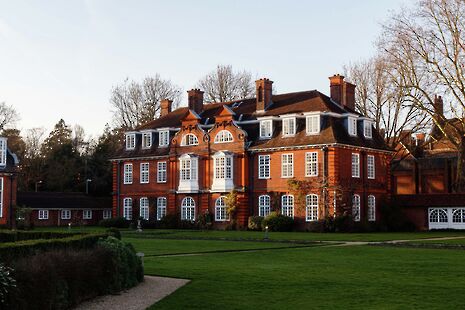Learning to be a real adult is rocky
Cambridge students aren’t being prepared for adulthood, writes Jess Lock

As I stepped into my flat last Wednesday, I was met with something untoward. Upon opening the front door, a stench so nuclear in its ferocity hit my unsuspecting nose. Now, I have a high tolerance for stink, but this was something for which I was unprepared. A cloying mix of chemical, gas and burning smells hung heavily in the air.
As I followed the reek to its source, my head began to swim. And there was the culprit: our 6-ft tall fridge-freezer combo was defrosting all over the kitchen floor. The oil cylinder had all but exploded. The weekly shop I had done less than 24 hours previously was decimated. The entirety of my freezer stock was obliterated and drooling a sticky substance. The landlady swiftly deemed the flat unfit for overnight stay, and just like that, I was alone in London with precisely £1.18 in my bank account.
The next few days brought additional annoyances. Panicking about my lack of cash and dwindling supply of tinned soup, I turned to vouchers. Deliveroo had sent a friend two £9 vouchers (with no minimum spend!) — more than enough for a few meals, even at London prices — that he graciously bestowed on me. Combined with another friend’s premium delivery account, I cashed in on four free meals. Except, not quite. On day two, my deliveries were nicked before they ever reached me.
Had I found myself without safe accommodation, with limited food and a brewing chest infection in Cambridge, I’d know full well where to start. As I’d done before, I’d apply for a hardship fund. I’d use credit to buy buttery food, or ask my closest friends to cook for me. I’d swiftly book in with the college nurse or the local GP. I’d talk to my tutor, director of studies, and supervisors to arrange for some leniency.
The disjunction between the coddled environment of college and ‘real life’ is frightening
I’m all too aware of how the pastoral systems in Cambridge can fail, particularly for the most vulnerable people living and working within this institution. Unforgiving staff and bureaucratic mazes of paperwork are all too common, barring those who most need support from accessing it. But as I traversed the city on funds borrowed from a friend, with food bought using vouchers, I couldn’t help but feel a sense of longing for the security of the collegiate system.
My relative comfort was established on pure luck. The only friend I have in the vicinity of London was able to host me. Had this not been the case, I would’ve had to seek out help from the colleagues I have known for just over two weeks. The very fact I had friends who would thoughtfully offer cash loans or divvy out their stashed coupons, was a privilege. Had I had a physical disability or dependants, my issues would’ve been far more complex and challenging.
And I won’t pretend that the systems in Cambridge aren’t prone to failure. I’ve experienced first hand the gross failures, inadequacies, and injustices that can occur through the dispersed collegiate system, and the institutionally racist, sexist, ableist, classist, transphobic, homophobic university in its entirety. Cambridge can and must do better.
But the disjunction between the coddled environment of college and ‘real life’ is frightening. Newnham provided three years of onsite accommodation. The buttery, if I had chosen to use it, catered for two meals a day, with the cafe offering breakfast. In theory, I could’ve lived my entire degree without having to buy food anywhere other than in my college. And that’s without even factoring in the bedders at other colleges, the cleaners who make our kitchens and bathrooms spotless, the laundry services — all little devices that smoothed my life over into one devoid of real adult responsibilities.
For three years I was coddled by the thought (if not the reality) of at least three pastoral points of contact, each designated to a unique sector of personal problem. And the responsibilities I observed my friends undertake at various other universities, be it privately renting or cleaning their own shit-stained toilet bowls, were swiftly removed by Cambridge’s hand-holding.
Learning to ‘adult’ is rocky and, since graduating, I’ve clocked just how unhelpful it is for Cambridge to neuter the sheltered exposure to adulthood any other university tends to offer. Falling face first into a week of exploding appliances and limited cash, temporarily losing my place to stay, and having to navigate these without the safety net of my college has been hard. I am torn between craving the comforts of Cambridge, and being irritated by my desire to return to it — adulting alone has been a far more immersive education than my degree ever was.
 Comment / The (Dys)functions of student politics at Cambridge19 January 2026
Comment / The (Dys)functions of student politics at Cambridge19 January 2026 News / Local business in trademark battle with Uni over use of ‘Cambridge’17 January 2026
News / Local business in trademark battle with Uni over use of ‘Cambridge’17 January 2026 Arts / Exploring Cambridge’s modernist architecture20 January 2026
Arts / Exploring Cambridge’s modernist architecture20 January 2026 Features / Exploring Cambridge’s past, present, and future18 January 2026
Features / Exploring Cambridge’s past, present, and future18 January 2026 News / Your Party protesters rally against US action in Venezuela19 January 2026
News / Your Party protesters rally against US action in Venezuela19 January 2026








